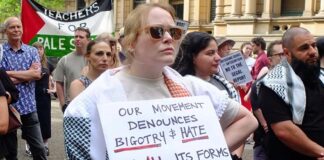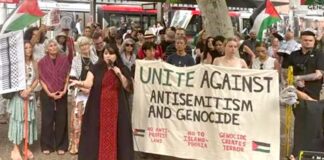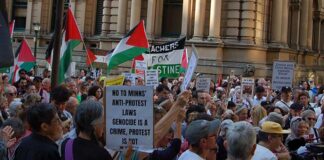The kidnapping of 200 schoolgirls by the Islamist group Boko Haram in Nigeria has caused an international scandal. The group believes the girls should not be at school, which it labels Western and anti-Islamic, and says that they will be sold into marriage.
Baba Aye of the Socialist Workers League in Nigeria explains the roots of Boko Haram and why military action against it is bound to fail
BOKO HARAM was formed in 2002. It built support by saying the corruption and social divisions in Nigeria are down to the Western values practiced by the country’s elite.
In the local Hausa language Boko means “fraud”, while Haram is “forbidden by God”. Western ideas are seen as fraudulent.
In response to a wave of Boko Haram attacks, the government declared a state of emergency in April last year across the three most northeastern of Nigeria’s 36 states—Borno, Adamawa, and Yobe.
Yet this only increased the levels of violence. According to Amnesty International at least 1500 people have been killed since then—almost half by the military.
Ministers present the Islamist group Boko Haram as a military security issue. But that’s absurd. Social and economic insecurity built it, and it feeds on rising levels of poverty and inequality.
The group gets support from tens of thousands of people who feel abandoned by Nigeria’s Western-backed elite. That is bigger than most trade unions in the country.
The group fuses sections of the middle class together with some of the poor masses. But a number among the elite also support it.
Ali Modu Sheriff courted Boko Haram in his successful bid for the governorship of Borno state in 2003.
Mohammed Ali Ndume has been accused of being its main financier. Both men are senators.
Poor
The middle class provide the group’s ideological leaders, but without the poor people who give them cover it would be impossible to keep going. This is true not only in its core areas, such as Borno, but also in the working class district of Nyanya, in the suburbs of the capital.
Boko Haram has a cell operating there which has recently carried out at least two bombings.
The government’s emergency laws must be renewed every six months. But now even some of the local elite are against them because of the upwards spiral of violence.
Nigeria’s corrupt rulers taught by the West
The Nigerian state has often struggled to maintain a grip on the country’s provinces.
Ken Saro Wiwa was arrested 19 years ago last month. His Movement for the Survival of the Ogoni People was a thorn in the side of multinational oil companies, including Shell. The state executed him and eight others.
At the time Nigeria was under military rule and the links between the dictatorship and the West shocked the world. Although the labour movement was proscribed in those years, in many ways it was much stronger then—ideologically, politically and organisationally.
In the 1990s we were fighting in a united front against the military. People generally assumed that once we achieved a civilian government we would get rid of corruption. It did nothing of the kind.
Then we were taking on a corrupt government, but today there are even more layers of corruption. We have the parliament, the executive and the judiciary—and they are all riddled with it.
This is not intrinsically Nigerian. Western multinationals operating here that are accused of corruption include Siemens, Halliburton, Shell and Chevron.
The head of the Nigerian central bank was suspended in February after lifting the lid on oil corruption. He said that $50 billion is unaccounted for. The government claims this is untrue—it insists the real figure is just $20 billion.
The elite boast that we will soon have the biggest economy in Africa. This has made some Nigerians very rich. But for the vast majority—the poor—living standards are getting worse. Over 63 per cent of the population live on less than $1 a day.
When the US talks about helping the Nigerian government, people should know it has a Predator drone base in Niger which borders Nigeria. But the Nigerian government is wary about giving it the right to overfly its territory.
Despite protests in Nigeria about government inaction, president Goodluck Jonathan made no comment about the abductions for three weeks—until they became an international news story.
Indeed the day after the news emerged he appeared dancing at a campaign rally. The elite has no idea how the poor see the world.





